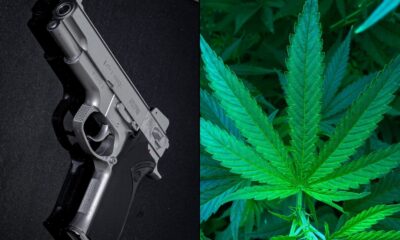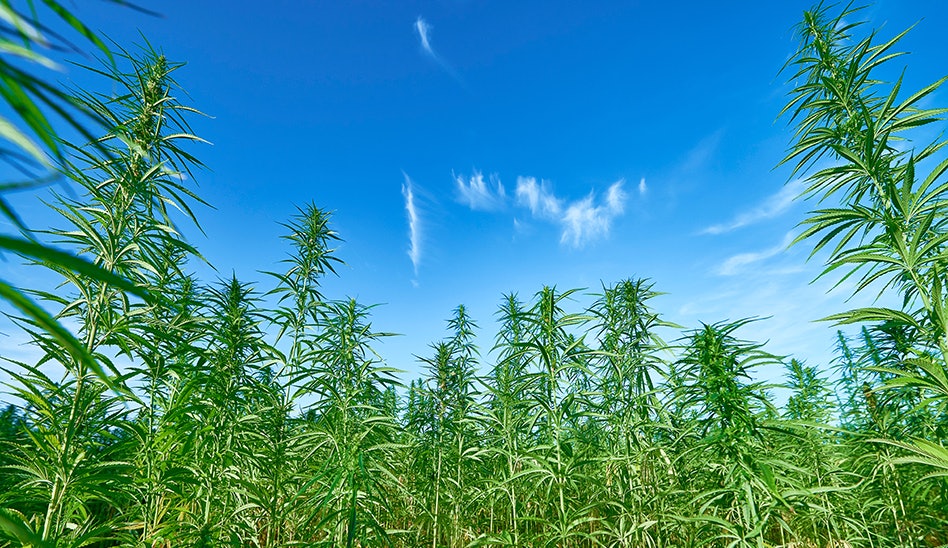featured
Now Is the Time to Embrace, Not Abandon, Cannabis Activism
Published
2 hours agoon

This article originally appeared in High Times Magazine’s 50th Anniversary Print Issue. Order yours here and get it delivered to your door.
Political and societal changes rarely occur organically. They only happen when advocates agitate for them.
For over five decades, NORML and its grassroots supporters have advocated for ending the criminalization, discrimination, and stigmatization of cannabis consumers. We have been deliberate and diligent in our efforts to change the way people talk and think about the marijuana plant and those who consume it.
It’s been – and it remains – an uphill battle. Our movement challenges powerful special interests, like law enforcement. Our work is deeply underfunded. Our advocates are often underrepresented in the mainstream media and in the political arena. But we are winning nonetheless because our message is irrefutable: It makes no sense from a public health perspective, a fiscal perspective, or a moral perspective to arrest, prosecute, and incarcerate adults who choose to responsibly consume a substance that is objectively safer than either alcohol or tobacco.
Also read: Want Clean, Safe Cannabis? Home Grow And Legal Access Are The Answer
At the time of NORML’s founding, only about one in ten Americans believed that cannabis should be legal. Today, 70 percent of Americans support legalization. There are several reasons for this dramatic shift in public opinion. One: the devastating effects of prohibition – including the arrest of over 30 million Americans, disproportionately young and poor people, for violating marijuana possession laws – have been laid bare for all to see. Two: the successes of legalization – including the public health benefits provided by the growing acceptance of medical cannabis and the economic benefits provided by regulated markets – have become impossible to deny. As more jurisdictions have moved to legalize the plant for either therapeutic or recreational purposes, public support for these policies has increased exponentially. In short, the more the public has first-hand experience with legalization, the more they like it.
But just because we have won the hearts and minds of the public doesn’t mean that we have successfully won the legalization battle. In fact, in some respects, it’s made our fight that much harder.
Many supporters now believe, falsely, that nationwide legalization is some sort of fait accompli and therefore, there’s no longer a need for grassroots advocacy. This perception is woefully incorrect. Our political and cultural opponents have not gone away. In many cases, they have regrouped and re-strategized. Knowing that their side has lost the war of ideas, they’ve pivoted to targeting democracy itself – at times attacking and undermining the ballot initiative process, in other instances, overturning marijuana-related election results they disapprove of. In jurisdictions where cannabis is legal, they are chipping away at consumers’ hard-won freedoms by lobbying for arbitrary potency limits (which would re-criminalize certain cannabis products as well as those who produce and consume them), pushing for artificially high sale taxes, and calling on cities and towns to impose bans on marijuana-related businesses.
Also read: Debunking Pot Potency Hysteria: The Truth About ‘Super-Strong’ Weed
Others presume that the corporate cannabis industry can sufficiently and successfully carry our movement to the next level. This is wishful thinking. While some players in the commercial cannabis space do provide limited financial support for grassroots activism, most cannot or do not. More concerningly, the interests of the cannabis industry do not always align with those of consumers. Issues that matter most to the cannabis community, such as securing home cultivation rights, expunging past criminal convictions, ending workplace discrimination, and strengthening parental rights, often get short shrift from industry players – who are far more likely to utilize their resources to lobby for changes in corporate tax codes and industry-specific regulations. In this vacuum, it is critical that activist groups like NORML and other grassroots organizers ensure that consumers’ voices, rather than corporate interests, remain prominent in the ongoing public policy debate. After all, there is no cannabis industry without cannabis consumers.
Finally, it goes without saying that our movement’s objectives are not met until federal cannabis prohibition is repealed. Despite most states having now legalized cannabis, all these policies – and more importantly, those who provide and consume cannabis under these laws – are in violation of federal law and remain in jeopardy of potential federal prosecution. This fact won’t change until the cannabis plant is removed from the federal Controlled Substances Act entirely. Reclassifying cannabis to a lower status, like Schedule III, is not a sufficient long-term solution and, in fact, it will perpetuate the growing divide between state and federal marijuana policies. For states to truly legalize cannabis without the threat of undue federal interference, the government must abandon its long-standing ‘Flat Earth’ policies once and for all. In short, the need for grassroots consumer-driven advocacy is more important than ever. Now is not the time for the cannabis community to rest on the laurels of its past successes or to presume that someone else is going to finish the job. Historically, it’s been the efforts of dedicated advocacy groups like NORML (along with longtime ally High Times) that have represented our culture and demanded that it be recognized and respected. Ultimately, it is this same activist community that must continue to lead this fight, and it is our community that will ultimately liberate the cannabis plant and cannabis consumers from the shackles of prohibition.
This article originally appeared in High Times Magazine’s 50th Anniversary Print Issue. Order yours here and get it delivered to your door.
Paul Armentano is the Deputy Director of the National Organization for the Reform of Marijuana Laws, America’s oldest cannabis consumers’ lobby. To become a member of NORML or to support NORML’s efforts, please consider making a donation here.
Photo by Luis Quintero on Unsplash

Author: mscannabiz.com
MScannaBIZ for all you Mississippi Cannabis News and Information.
You may like
-


Guess What Is Threading Its Way Back To Being Popular
-


39 Attorneys General Tell Federal Lawmakers to Ban Hemp THC Products
-


No One Is Giving Your Kids Marijuana Edibles in Their Halloween Candy
-


Florida Case On Medical Marijuana Patients’ Gun Rights Is On Hold As Supreme Court Weighs Underlying Issue
-


CULTA Appoints Cannabis Industry Veteran Joseph Andreae as CEO
-


The Creature from the Black Leather Lagoon
featured
Guess What Is Threading Its Way Back To Being Popular
Published
19 minutes agoon
October 27, 2025
Guess what is threading its way back to being popular — Gen Z’s surprising new obsession is sew cool.
In a generational twist, young Americans are falling in love with their grandparents’ pastimes. From vinyl records spinning on turntables to typewriters clacking again on dorm desks, Generation Z and Millennials are breathing new life into analog culture. Now, they’re taking nostalgia one step further. You will never guess what is threading its way back to being popular now – sewing machines.
Across TikTok, Instagram, and even in big-box aisles at Costco, sewing is emerging as the latest hands-on hobby to stitch its way back into mainstream life.
RELATED: Immersive Events Redefine Millennial Nights
From gardening and journaling to reviving the look of thrifted 1980s windbreakers, Gen Z has turned “old-fashioned” into “on trend.” This generation values individuality, sustainability and creative expression — all things found in vintage-inspired pursuits. Just as vinyl and Polaroid cameras have made a comeback, sewing fits perfectly into the same ethos: it’s tactile, personal, and proudly non-digital.
The resurgence of hands-on creativity isn’t random. It’s a counterbalance to a world that’s often fast, online and disposable. In a sense, young people aren’t just buying less — they’re making more.

Why Sewing Is Trending Again
1. Crafting identity and self-expression
For many, sewing is a declaration of independence from fast fashion. Customizing or making your own clothing offers a sense of empowerment — a creative outlet says, “I made this.” On social media, this translates into content celebrating originality, individuality and style over mass production.
2. Sustainability and slow fashion
Gen Z and Millennials care deeply about sustainability. Sewing gives them a way to reuse, repurpose and repair, rather than toss and replace. Visible mending — repairing clothing in a way shows off the stitches as part of the design — has become a viral movement on TikTok.
3. Screen-break creativity
With most of life lived online, sewing provides an analog escape. It’s hands-on, calming and meditative — a way to literally disconnect from screens. A recent Fortune article noted many young adults are learning to sew “to get off their phones and save money.”
4. The social media effect
TikTok and Instagram have made sewing trendy, not tedious. Hashtags like #sewingtutorial, #upcycledfashion and #thriftflip are filled with videos showing transformations from thrift-store finds to high-fashion looks. Tutorials and time-lapse reels make the craft feel approachable and rewarding — especially when the finished product is instantly shareable.
RELATED: The Connection Between Country Music And Cannabis
When a major retailer starts stocking modern sewing machines, you know something’s changing. Costco now offers sleek, computerized models like the Singer Heavy Duty 8832 and Brother XR3340, complete with LCD screens, hundreds of stitch patterns, and built-in quilting options. These aren’t your grandmother’s machines — they’re tech-forward tools align with the DIY spirit of younger shoppers.
The fact Costco, known for bulk groceries and electronics, now markets sewing machines signals just how mainstream this revival has become. The craft aisle isn’t just for hobbyists anymore — it’s for creators, side-hustlers and trendsetters.
On Instagram and TikTok, sewing creators are building large, loyal followings. Whether it’s a 20-second video of a thrifted denim jacket getting a new lining or a full tutorial on turning curtains into dresses, sewing content fits perfectly into Gen Z’s creative economy. It’s visually satisfying, shareable, and aspirational in a grounded way — making something from nothing.
Younger users are even reframing the stereotype of sewing as something only grandmothers do. Many proudly show off learning from older relatives while adding a modern twist, connecting generations through thread and fabric.

Author: mscannabiz.com
MScannaBIZ for all you Mississippi Cannabis News and Information.
featured
39 Attorneys General Tell Federal Lawmakers to Ban Hemp THC Products
Published
1 hour agoon
October 27, 2025
The chief law officers from 37 states and two U.S. territories sent a letter Oct. 24 to U.S. House and Senate committee leaders, asking them to stop “dangerous and intoxicating” hemp-derived THC products from being sold and manufactured.
The bipartisan coalition of 39 attorneys general, including those from Puerto Rico and the U.S. Virgin Islands, asked that Congress redefine hemp to close what many have termed an unintended “loophole” in the 2018 Farm Bill, which federally legalized the commercial cultivation of hemp.
Arkansas Attorney General Tim Griffin, along with his counterparts from Indiana (Todd Rokita), Connecticut (William Tong) and Minnesota (Keith Ellison), spearheaded the letter that they signed with other members of the National Association of Attorneys General (NAAG).
“Since the passage of the 2018 Farm Bill, hemp-derived THC products – often more potent than marijuana – have flooded the market due to a misinterpretation of the bill’s language,” Griffin said in a separate press release. “These synthetic cannabinoids, including delta-8, delta-10, THC-O, and others, are being sold in gas stations, convenience stores and online retailers across the country, frequently in packaging purposefully designed to appeal to children.”
The attorneys general sent the letter to the Appropriations and Agriculture committee chairs in both the Senate and House, including Sen. Susan Collins, R-Maine; Sen. John Boozman, R-Ark.; Rep. Tom Cole, R-Okla.; and Rep. Glenn “GT” Thompson, R-Pa.
The letter signers asked the congressional leaders to clarify the definition of hemp through the fiscal 2026 appropriations process or through the farm bill’s pending reauthorization to “leave no doubt that these harmful products are illegal.” The letter signers asked that Congress criminalize the sale and manufacture of intoxicating hemp products.
“Intoxicating hemp-derived THC products have inundated communities throughout our states due to a grievously mistaken interpretation of the 2018 Farm Bill’s definition of ‘hemp’ that companies are leveraging to pursue profits at the expense of public safety and health,” the attorneys general wrote. “Many of these products – created by manufacturers by manipulating hemp to produce synthetic THC – are more intoxicating and psychoactive than marijuana, a Schedule I controlled substance, and are often marketed to minors. Unless Congress acts, this gross distortion of the 2018 Farm Bill’s hemp provision will continue to fuel the rapid growth of an underregulated industry that threatens public health and safety and undermines law enforcement nationwide.”
In addition to the abovementioned states and territories, the letter was also signed by attorneys general from Alabama, Arizona, California, Colorado, Delaware, Georgia, Hawaii, Illinois, Iowa, Kansas, Louisiana, Maine, Maryland, Massachusetts, Mississippi, Missouri, Nebraska, Nevada, New Hampshire, New Mexico, New York, North Carolina, North Dakota, Ohio, Oklahoma, Pennsylvania, Rhode Island, South Carolina, South Dakota, Utah, Vermont, Virginia and Wyoming.
Sen. Mitch McConnell, R-Ky., who championed the federal legalization of commercial hemp cultivation in 2018 as a pathway for Kentucky’s struggling tobacco farmers to benefit from a new agricultural commodity, said in July that he had never intended for the farm bill to “open the door to the sale of unregulated, intoxicating, lab-made, hemp-derived substances with no safety framework.”
That admission came as 27 Senate Appropriations Committee members voted unanimously to approve a 136-page spending bill that included language to ban hemp-derived products containing synthetic compounds and/or quantifiable amounts of THC or THCA, or other cannabinoids that have similar effects on humans or animals. McConnell termed the language as a legislative fix to align with the original intent of the 2018 Farm Bill.
However, Sen. John Hoeven, R-N.D., who chairs the Appropriations Agriculture-Food and Drug Administration (FDA) subcommittee, notified reporters later in July that the hemp THC product language was struck by a manager’s amendment before final passage. The language was pulled because Sen. Rand Paul, R-Ky., threatened to block the entire legislation, which includes more than $27 billion in discretionary funding to support farmers, rural communities and nutrition programs, if the hemp language wasn’t stricken.
Paul, who supports regulation over prohibition, said in September 2024 that he hopes to protect the legalized hemp industry by preventing the federal government “from weighing down our farmers with unnecessary bureaucratic micromanaging.”
As many states have already implemented laws to regulate or ban consumable products containing hemp derivatives, many believe Paul’s pushback at the federal level has only delayed the inevitable. A finalized agriculture spending bill has yet to pass Congress.
“Congress never meant to legalize these products in the 2018 Farm Bill,” the 39 attorneys general wrote. “A proper interpretation of the farm bill’s hemp provision demonstrates that the entire synthetic THC industry rests on a foundation of illicit conduct. Clear direction from Congress is needed to shut down this industry before it metastasizes further into an even greater threat to public safety than it already is.”
While the bipartisan coalition said that the 2018 Farm Bill intended to provide an industrial hemp commodity for the fiber and grain markets, the legislation’s 0.3% delta-9 THC on a dry-weight basis definition established an inadvertent ambiguity that has allowed “bad actors” to exploit the American public with “dangerous drugs” through highly advanced chemical processes.
The attorneys general pointed to the often-used chemical process of converting nonintoxicating CBD from the hemp plant into intoxicating delta-8 THC. The letter writers also pointed to laboratory-created or altered compounds like delta-10 THC, THC-O, THCP and HHC, which are then infused “at high concentrations into a multitude of products that can intoxicate a person as severely as the most potent strains of cannabis sold on the illicit market.”
“In other words,” the attorneys general wrote, “industry actors have nefariously misinterpreted the farm bill’s legalization of low concentrations of hemp-derived delta-9 and the bill’s silence regarding hemp-derived THC products other than delta-9 to claim that the farm bill allows them to produce and sell various synthetic cannabinoids regardless of the chemicals’ potency and psychoactive effects.”
The attorneys general said these “Frankenstein THC” products play by their own set of rules – including age restrictions, labeling standards and testing requirements – and have led to “stark and severe” public health consequences.
In Indiana, where medical and adult-use cannabis programs remain prohibited, total cannabinoid and analog exposures reported to poison control centers increased 41% between 2022 and 2024, with pediatric exposures under age 5 rising 46% and exposures among children aged 6–12 increasing 62%, according to the state’s Department of Health.
Indiana Attorney General Todd Rokita was among the four signers who spearheaded the letter.
State-level efforts to rein in the hemp-derived cannabinoid product marketplace are not enough, according to the bipartisan coalition.
“Such efforts can only lead to an uneven and ineffectual patchwork of bans and regulations that differ from state to state and will not stop the flood of mail-order THC products from streaming through interstate commerce,” they wrote. “Congress must act to salvage the 2018 Farm Bill’s laudable legalization of commercial hemp from the psychoactive hemp industry’s spoliation of the bill’s hemp provision.”

Author: mscannabiz.com
MScannaBIZ for all you Mississippi Cannabis News and Information.
featured
No One Is Giving Your Kids Marijuana Edibles in Their Halloween Candy
Published
3 hours agoon
October 27, 2025

It’s Halloween season, which means it’s time for your local news outlets to once again warn viewers about a virtually non-existent threat: the notion that there are large groups of insidious people just waiting to give your trick-or-treating children free cannabis edibles. This is one of those marijuana myths that keeps coming back from the dead every time the pumpkins start popping up on your neighbors’ doorsteps.
No one is knowingly giving out edibles to children as Halloween candy. First, doing so would be grossly irresponsible. NORML’s longstanding ‘Principles of Responsible Cannabis Use’ specify that cannabis is for “adults only” and that consumers “do not violate the rights of others.” Second, it would be cost-prohibitive. Regulated cannabis products cost exponentially more than traditional candy. Third, doing so exposes would-be pranksters to serious criminal penalties, as distributing cannabis to minors is a felony offense in almost all circumstances. Fourth, legal state-regulated cannabis products are subject to strict packaging laws that make them readily distinguishable from traditional candy, as well as from irresponsibly packaged unregulated products. For these reasons, there are few, if any, reports of this happening in the real world, only in the minds of ratings-crazed newsrooms and fear-mongering prohibitionists.
There will always be a very small number of people with malicious intentions and, as a result, parents should always check their kids’ Halloween haul to ensure that their treats are safe and appropriate. That goes without saying. But there’s no data to support the unfounded claims that the statewide regulation of either adult-use or medical-use cannabis products is unduly putting children’s safety at risk — not on Halloween or any other day of the year. In fact, over the past decade, marijuana use by teens has fallen to historic lows.
Writing for NBC News, journalist Simon Moyer-Smith said it best:
“Halloween, of course, is a time of fear: ghouls, goblins, haunted houses and the sheer volume of leftover candy that will be around to tempt you. But it’s not a time to stoke fear about things that aren’t based in evidence and truth — and definitely not a time to demonize marijuana yet again.
… No one, absolutely no one, will be handing out marijuana edibles en masse to unsuspecting minors this Halloween. … If you want to be scared of something on Halloween night, it shouldn’t be edibles in your kid’s treat bag but drunken drivers on the road.
… So fear demons, drunk drivers and Dum Dums, but there’s no need to worry that edibles will be given out willy-nilly to trick-or-treaters on Halloween.”
So go ahead NORML Nation, have a fun, safe, and evidence-based Halloween – and of course, enjoy your edibles responsibly and keep them safely out of the hands of children.
Related

Author: mscannabiz.com
MScannaBIZ for all you Mississippi Cannabis News and Information.

Guess What Is Threading Its Way Back To Being Popular

39 Attorneys General Tell Federal Lawmakers to Ban Hemp THC Products

Now Is the Time to Embrace, Not Abandon, Cannabis Activism

No One Is Giving Your Kids Marijuana Edibles in Their Halloween Candy

Florida Case On Medical Marijuana Patients’ Gun Rights Is On Hold As Supreme Court Weighs Underlying Issue

CULTA Appoints Cannabis Industry Veteran Joseph Andreae as CEO

The Creature from the Black Leather Lagoon

Cannabis industry case challenging prohibition hits Supreme Court (Newsletter: October 27, 2025)

I Worked a Day as a Budtender in Brooklyn: Here’s What I Learned

Trump’s ‘Stupid’ Drug War Killings Put Military In Untenable Position, Former GOP Attorney General Of Idaho Says (Op-Ed)

Oregon Officials Seek To Dismiss Psilocybin Access Lawsuit From Homebound Patients

South Dakota Medical Marijuana Advocates Alarmed After Lawmakers Give Prohibitionists A Platform

What Levi Strauss Can Teach Us About Craft and Cannabis

Michigan Lawmakers Consider Bills To Change Legal Marijuana Possession Limits And Alter Industry Disciplinary Rules

Bad Stoner Horror: The 10 Worst-Rated 420 Scary Movies

Vee the Traveling Cannabis Writer Unveils First Book in Cannabis Legacy Series – Ganjapreneur

[Video] G Herbo: Snoop Rolled My Blunt and Let Me Hit It, Smoking A Zip a Day, Chicago Munchies (Weird) and What’s Next

Marijuana Companies Ask U.S. Supreme Court To Take Up Case Challenging Constitutionality Of Federal Prohibition

The Odds Of The Feds Making A 2025 Cannabis Change

The Epic High Times Cannabis Cup Journey, From Amsterdam to the Empire State

GOP Senator Pushes To Study—Rather Than Ban—Hemp Products, As State Attorneys General Call For THC Prohibition

Happy International Champagne Day – The Fresh Toast

Maryland Police Want To Watch You Smoke Weed: Free Munchies and Ride Home Included

More Americans Now Use Marijuana Than Smoke Cigarettes, New Study Shows

Alert: Department of Cannabis Control updates data dashboards with full data for 2023

Connecticut Appoints The US’s First Cannabis Ombudsperson – Yes there is a pun in there and I’m Sure Erin Kirk Is Going To Hear It More Than Once!

5 best CBD creams of 2024 by Leafly

Recreational cannabis on ballot for third time in South Dakota

EU initiative begins bid to open access to psychedelic therapies
New Study Analyzes the Effects of THCV, CBD on Weight Loss

Free delta-9 gummies from Bay Smokes

5 best autoflower seed banks of 2024 by Leafly

Discover New York’s dankest cannabis brands [September 2024]

May 2024 Leafly HighLight: Pink Runtz strain

Press Release: CANNRA Calls for Farm Bill to Clarify Existing State Authority to Regulate Hemp Products

5 best THC drinks of 2024 by Leafly

Local medical cannabis dispensary reacts to MSDH pulling Rapid Analytics License – WLBT

6 best CBD gummies of 2024 by Leafly

Curaleaf Start Process Of Getting Their Claws Into The UK’s National Health System – With Former MP (Resigned Today 30/5/24) As The Front Man

Horn Lake denies cannabis dispensary request to allow sale of drug paraphernalia and Sunday sales | News

5 best delta-9 THC gummies of 2024 by Leafly

The Daily Hit: October 2, 2024

Mississippi city official pleads guilty to selling fake CBD products

Nevada CCB to Accept Applications for Cannabis Establishments in White Pine County – “Only one cultivation and one production license will be awarded in White Pine County”

5 best THCA flower of 2024 by Leafly

Weekly Update: Monday, May 13, 2024 including, New Guide for Renewals & May Board meeting application deadline

6 best hemp pre-rolls of 2024 by Leafly

PRESS RELEASE : Justice Department Submits Proposed Regulation to Reschedule Marijuana
Trending
-

 California Cannabis Updates1 year ago
California Cannabis Updates1 year agoAlert: Department of Cannabis Control updates data dashboards with full data for 2023
-

 Breaking News1 year ago
Breaking News1 year agoConnecticut Appoints The US’s First Cannabis Ombudsperson – Yes there is a pun in there and I’m Sure Erin Kirk Is Going To Hear It More Than Once!
-

 best list1 year ago
best list1 year ago5 best CBD creams of 2024 by Leafly
-

 Business1 year ago
Business1 year agoRecreational cannabis on ballot for third time in South Dakota
-

 Business1 year ago
Business1 year agoEU initiative begins bid to open access to psychedelic therapies
-

 cbd1 year ago
cbd1 year agoNew Study Analyzes the Effects of THCV, CBD on Weight Loss
-

 Bay Smokes1 year ago
Bay Smokes1 year agoFree delta-9 gummies from Bay Smokes
-

 autoflower seeds1 year ago
autoflower seeds1 year ago5 best autoflower seed banks of 2024 by Leafly


